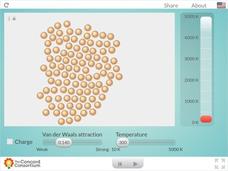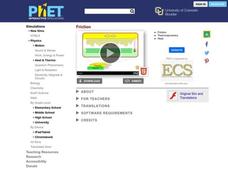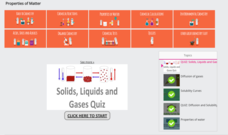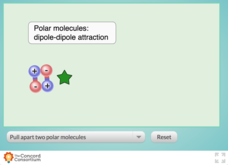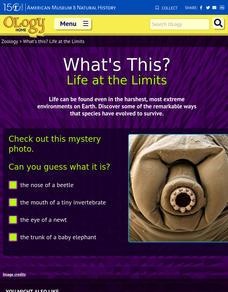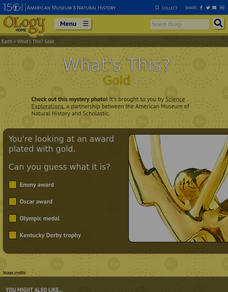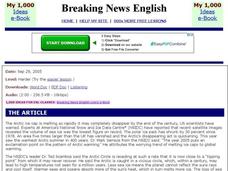Concord Consortium
Seeing Specific Heat and Latent Heat
What happens inside a melting solid? Prospective physical chemists observe a solid-to-liquid phase change at the molecular level using an inspired interactive. Pupils add heat to a close system, then monitor changes in kinetic and...
Concord Consortium
Specific Heat and Latent Heat in Condensation
There's more to melting than meets the eye! Junior physical chemists investigate the differences between specific and latent heats as a substance undergoes a phase change. Users remove heat from the system and observe changes in kinetic...
Concord Consortium
Charged and Neutral Atoms
Do charged and neutral particles behave differently as they undergo phase changes? Science sleuths examine two types of attractive forces using an informative interactive. Pupils can vary the amount of Van der Waals attraction present...
PHET
Energy Forms and Changes
Is the ice cooling down the water or is the water melting the ice? Here is a simulation that explores thermal energy transfer with iron, brick, and water. It demonstrates the flow of energy and what happens when each material is either...
PHET
Friction
Friction leads to movement, heat, and melting on such a small scale most people don't notice. A short simulation permits scholars to observe the reaction between atoms as they move together. The simulation applies the concept of...
CK-12 Foundation
Don't Slip
Salt is the go-to material when people need to melt ice—learn the chemistry behind its effectiveness with an interactive lesson. Pupils watch a short narrative and then explore the concept through a simulation. Young scientists...
CK-12 Foundation
Mixed Numbers in Applications: Sharing a Chocolate Bar
The advantage of a virtual chocolate bar: it never melts. Learners use an interactive to share a chocolate bar among friends. Some challenge questions assess understanding of fractions in relation to this context.
Fuse School
Quiz: Solids, Liquids and Gases
Time to show what they know! Module five in a 14-part series about solids, liquids, and gases redirects to an interactive quiz. Learners test their skills on topics such as states of matter, phase changes, and Brownian Motion. With...
Royal Society of Chemistry
Alloys
What are alloys, and why do we use them? Through a series of interactive puzzles, scholars examine the components and uses of several common alloys. The accompanying teacher's resources provide support in using the lesson, printable...
Royal Society of Chemistry
Symbols
Chemistry calculations can look a bit like alphabet soup at times. How do you help pupils make sense of it all? An interactive resource helps scholars sort through the symbols for common quantities such as moles, boiling point, and...
CK-12 Foundation
It's Just a Phase
Explore the phases of water as temperature rises. Pupils consider the idea that temperature remains constant during each phase change. An interactive exercise allows your young scientists to observe the temperature and molecular...
Concord Consortium
Comparing Dipole-Dipole to London Dispersion
Which intermolecular force is the strongest? Scholars test the relative strength of London dispersion forces, dipole-dipole interactions, and induced dipoles using a simulator. The interactive allows learners to pull on paired molecules...
Jefferson Lab
The Periodic Table of Elements
A study of the periodic table of elements doesn't have to be elementary! Deepen understanding of the building blocks of chemistry with an interactive periodic table. At first sight, the table looks like a standard reference page, but a...
American Museum of Natural History
What's This? Life at the Limits
There are some amazing ways species evolve to survive. From large ears to sneezing salt, learners read about these interesting adaptations in an interactive lesson. Great to supplement an in-class lesson, it also works well as a remote...
American Museum of Natural History
What Do You Know About Earth?
Time to rock and roll! Young scientists test their knowledge about rocks found on Earth and what they tell scientists. A 10-question quiz focuses on the different types of rocks, how they are formed, and what they are made of.
American Museum of Natural History
What's This? Gold
Cell phones are likely made of gold—at least part of them! An interesting lesson explains the conventional and not-so-conventional uses of the popular element gold. From the Inca empire to modern-day technology, learners discover gold...
Curated OER
English Vocabulary Skills: AWL Sublist 1 - Exercise 1b
In this online interactive English vocabulary skills worksheet, students answer 10 matching questions which require them to fill in the blanks in 10 sentences. Students may submit their answers to be scored.
Curated OER
Easily Confused Words: Lead and Led
Although not quite as confusing as their, they're, and there, many people have difficulty with lead, lead (the toxic metallic), and led. Review these basic sentences with your third and fourth graders, and have them complete the...
Curated OER
Easily Confused Words: Role and Roll
Do your kids confuse role and roll? Discuss the difference with them, show them the example sentences provided, and have them take the short quiz that follows.
Curated OER
Misplaced and Dangling Modifiers
When reviewing the use of modifiers, this activity could be a useful tool to use. With 20 questions, highlighting a variety of misplaced or dangling modifiers, this learning exercise could be a quick and easy way to go over this topic.
Curated OER
Breaking News English: Global Warming
For this Global Warming worksheet, students read the article, answer true and false questions, complete synonym matching, complete phrase matching, complete a gap fill, answer short answer questions, answer discussion questions, write,...
Curated OER
Comparing Covalent and Ionic Substances
In this covalent and ionic substances worksheet, students use the internet to find information about the characteristics of covalent and ionic substance and explain what causes the differences in these types of substances.
Curated OER
Telling Temperature
In this recognizing temperatures on a thermometer online interactive activity, students refer to a thermometer with numbers from minus twenty to one hundred to answer questions. Students choose 12 multiple choice answers.
Curated OER
Better English Lessons: Grammar Skills, "If" #2
In this online interactive English skills worksheet, students respond to 20 multiple choice questions that require them to select the appropriate words to complete the sentences. Answers are scored immediately.
Other popular searches
- Ice Cube Melting Experiment
- Meltdown
- Melting Pot
- Melting Point
- Melted Crayons
- Melting and Evaporation
- Melted Crayon Art
- Melting Point Boiling Point
- Melting and Boiling Point
- Melting Pot, Salad Bowl
- Melting Ice
- Freezing and Melting


